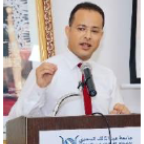
Otmane Omari
Work place: Polydisciplinary Faculty of Larache, Abdelmalek Essaâdi University, Larache, Morocco
E-mail: otmane.omari@uae.ac.ma
Website:
Research Interests: E-Business, E-learning
Biography
Dr. Otmane Omari, Ph.D. in Linguistics and MA in Business Communication, he is an assistant professor of English at Abdelmalek Essaâdi University in Morocco. Driven by a deep passion for integrating technology into education, he creates an engaging and dynamic learning environment. As the Editor-in-Chief of the International Journal of Technology, Innovation, and Education (TIE), he contributes significantly to educational discussions. His research focuses on improving the quality of learning in higher education, fostering lifelong learning skills, and promoting effective problem-solving. Dr. Omari’s commitment to improving learning experiences aligns with his vision of empowering students with skills that go beyond traditional course materials preparing them for the challenges of the modern world. His areas of interest include Self-Regulated Learning, applied linguistics, EFL/ESL, e-learning, self-efficacy, business English, Life Long Learning, and motivation.
Author Articles
Overview of Deaf Education in Morocco
By Abdelaziz Arssi Otmane Omari
DOI: https://doi.org/10.5815/ijmecs.2024.03.07, Pub. Date: 8 Jun. 2024
This paper provides a comprehensive overview of Deaf Education in Morocco documenting its historical evolution and systematically assessing current instructional methodologies. With a focus on learning and teaching environments, the study aims to offer a wide understanding of the educational opportunities, teaching methods, and teacher training programs within Moroccan schools serving the Deaf community. The research questions guide the inquiry addressing historical paths, the influence of teaching methods, and common challenges. By identifying challenges and evaluating practices, the research makes methodological and theoretical contributions to the fields of special education and Deaf education in Morocco. This foundational resource, which is lacking in Moroccan research, serves as a basis for future investigations into instructional approaches. The study navigates through Morocco’s educational history from colonial impact to post-independence reforms emphasizing challenges like pedagogical strategies, infrastructure limitations, and social integration issues. The findings confirm the importance of shifting negative attitudes, fostering inclusivity, and reassessing policies to enhance the educational journey for Deaf learners in Morocco.
[...] Read more.Other Articles
Subscribe to receive issue release notifications and newsletters from MECS Press journals